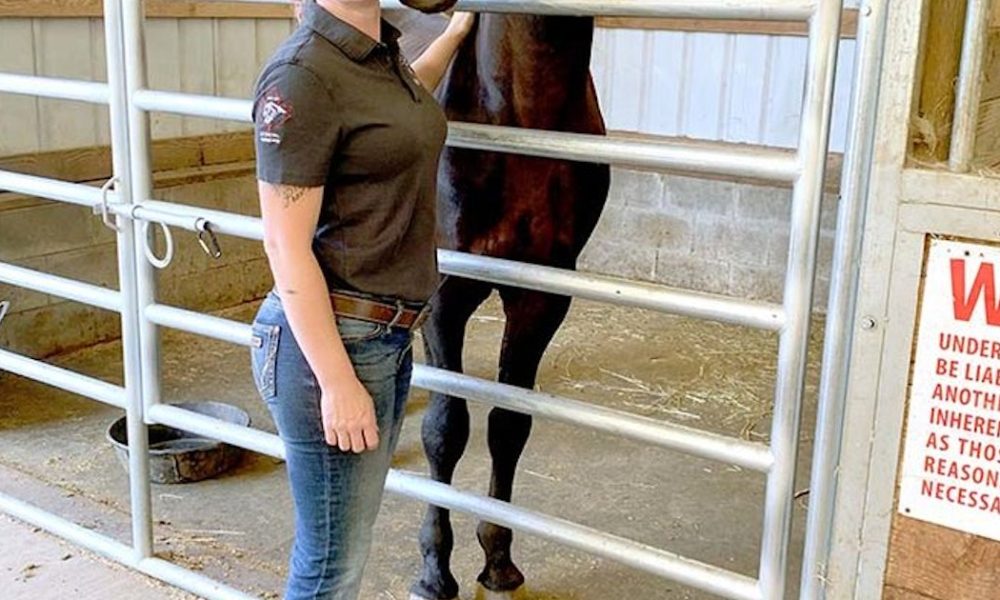 Naomi Driscoll with a Canadian stallion named Dreamboy Curt. Naomi is one of the owners of Misfit Toy Ranch in Cottage Grove, which is transitioning into breeding heritage Canadian horses. Aliya Hall
Naomi Driscoll with a Canadian stallion named Dreamboy Curt. Naomi is one of the owners of Misfit Toy Ranch in Cottage Grove, which is transitioning into breeding heritage Canadian horses. Aliya Hall
The idea for the name Misfit Toy Ranch came from co-owner Zach Driscoll because when their ranch started in 2013 it became known as the place that would take horses that were no longer wanted, or that needed a new home due to life changes.
”My husband said we were the Island of Misfit Toys,” co-owner Naomi Driscoll said. The name – which hearkens back to the 1964 stop-motion television production, ”Rudolph the Red Nosed Reindeer” – stuck, and is incorporated into their branding symbol: a rocking horse.
In the last six months, however, Misfit Toy Ranch has transitioned their operation from being a repurposing, training and boarding facility to breeding heritage Canadian horses.
”I’ve trained a lot of different breeds. I’m one of those riders and horse people who love horses for what they are, and these are versatile,” Naomi said of the Canadian horses. ”To be competitive with what I want to do (in showing horses) it’s hard to find a horse that can withstand it, physically and mentally. I stumbled upon the breed and that was it.”
Naomi noted that there is an old saying: ”The way to make $1 million with horses is to start with $2 million.” The ranch started as a labor of love, more than a for-profit business. She said they relied on Zach’s military salary and her earnings from training and lessons, which they put back into the business.
When they transitioned to Canadians, Naomi said they ”used the best assets we had for start-up costs,” which meant selling their most valuable personal riding horses that were used for lessons and competitions.
”That gave us the money to purchase our first stallion and mares, and the funds to drive to Texas for our second stallion,” Naomi explained. ”The goal on the horizon is that within five years we will have a nice stock that we have bred and trained for sale.”
The Canadian breed was established in the 1600s, and due to their hardiness and temperament, were commonly used during wars. The horses were used in the Civil War, as well as the two world wars, which diminished their numbers. The Canadian government stopped exporting the horses, but didn’t promote breeding; by 1974, there were only 400 of the horses left in the world, Naomi said.
Now, the number has risen to around 2,500, but there aren’t many younger breeders coming into the field, which is why Misfit Toy Ranch doesn’t just want to breed the horses, they want to promote them. During the Cottage Grove Rodeo, Naomi won the competition to carry the flag and rode one of her Canadian stallions.
Zach said there’s more to breeding than ”a mommy horse and a daddy horse make a baby horse,” which has been one of the challenges for him.
”You have to know when (the mares) are cycling, the right day to breed, and there might be excess fluid in the uterus – therefore you have to administer injections to dry it out a little bit,” he explained. ”Oh, there’s so much.”
Naomi, who worked as a veterinary technician for 15 years, has experience in breeding, but said the challenge is to ”not only make sure the program is going appropriately but that I’m training my husband appropriately.” She is teaching him as well, before they get into the breeding process.
One of the hardest parts of the transition for both of them is saying no to horses they would have been able to take if they were still simply rehoming. Zach said that out of the 70 horses they have had on their ranch, 67 of them have been able to be rehomed; for horses that can’t be rehomed, due to injury or behavioral problems, Naomi said are humanely euthanized.
The Misfit Toy program has been an important part of their business. Naomi said that the ranch is not a rescue, but a repurposing place to give horses the right home. Horses have come from all over and she said that they all have their own story. Even though they are stepping away from rehabilitation, there is a horse rescue center in Eugene and multiple other rehabilitation centers throughout Oregon.
Having owners of the rehomed horses share photos about the animals is one of the most rewarding aspects for Naomi.
”That’s incredible for me to see it,” she said. ”It brings a smile to my face, to continue to hear that people are happy with the horse that we paired them with.”
With the heritage breeding, she said that discovering a breed of horse that is almost gone and helping to continue their lineage, especially with the role the breed has had in American history, is another reward.
”This is a marathon, not a sprint, when it comes to the business plan,” Zach added. ”But in the end, it will be worth the sweat equity invested.”
Unlike Naomi, Zach had only been around horses as a kid, and he didn’t realize until they started the ranch how much of a relationship he could have with the animals.
”Not a lot of people understand the ability and connection you can have with a horse,” he said.
He added that as a veteran who served in Afghanistan, he does struggle with Post Traumatic Stress Disorder (PTSD), and coming home to work with the horses has been a sanctuary where he can emotionally decompress: ”This is happiness right here: dirt on your fingertips from cleaning them and scratching them.”








